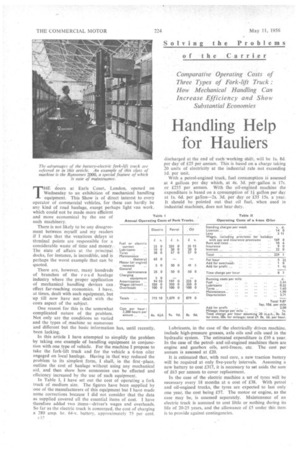Handling Help for Hauliers
Page 78

If you've noticed an error in this article please click here to report it so we can fix it.
_
THE doors at Earls Court, London, opened on Wednesday to an exhibition of mechanical handling equipment. This Show is of direct interest to every operator of commercial vehicles, for there can hardly be any kind of road haulage, except perhaps light van work, which could not be made more efficient and more economical by the use of such machinery.
There is not likely to be any disagreement between myself and my readers if I state that the vexatious delays it terminal points are responsible for a considerable waste of time and money. The state of affairs at the principal docks, for instance, is incredible, and is perhaps the worst example that can be quoted.
There are, however, many hundreds of branches of the r oad haulage industry where the proper application of mechanical handling devices can effect far-reaching economies. 1 have, at times, dealt with such equipment, but up till now have not dealt With the costs aspect of the subject.
One reason for this is the somewhat complicated nature of the problem. Not only arc the conditions so varied and the types of machine so numerous and different but the basic information has, until recently, been lacking.
In this article I have attempted to simplify the problem by taking one example of handling equipment in conjunction with one type of vehicle. For the machine I propose to take the fork-lift truck and for the vehicle a 6-ton oiler engaged on local haulage. Having in that way reduced the problem to its simplest form, I shall, in the first -place, outline the cost of haulage without using any mechanical aid, and then show how economies can be effected and efficiency increased by the use of such equipment
In Table I, I have set out the cost of operating a fork truck of medium size. The figures have been supplied by one of the manufacturers of this equipment but I have made some corrections because I did not consider that the data as supplied covered all the essential items of cost. 1 have therefore added two items-driver's wages and overheads. So far as the electric truck is concerned, the cost of charging a. 280 amp. hr. 64-v. battery, approximately 75 per cent. 112.
discharged at the end of each working shift, will be ls. 8d. per day of £25 per annum. This is based on a charge taking 20 units of electricity at the industrial rate not exceeding 1d. per unit.
With a petrol-engined truck, fuel consumption i assessed at 4 gallons per day which, at 4s. 3d. per gallon is 17s. or £255 per annum. With the oil-engincd machine the expenditure is based on a consumption of 11 gallon per day at Is. 6d. per gallon-2s. 3d. per day or £35 15s. a year. It should he pointed out that oil fuel, when used in industrial machines, does not bear duty.
Lubricants, in thc case of the electrically driven machine, include high-pressure greases, axle oils and oils used in the hydraulic system. The estimated expenditure is £10 a year. In the case of the petroland oil-engined machines there are engine and gearbox oils, anti-freeze, etc. The cost per annum is assessed at £20.
It is estimated that, with real care, a new traction battery will be required at only five-yearly intervals. Assuming a new battery to cost £317, it is necessary to set aside the sum of £63 per annum to cover replacement.
In the case of the electric machine a set of tyres will be necessary every 18 months at a cost of £38. With petrol and oil-engined trucks, the tyres are expected to last only one year, the cost being £57. The motor or engine, as the case may be, is assessed separately. Maintenance of an electric truck is assumed to cost little or nothing during its life of 20-25 years, and the allowance of £5 under this item is to provide against contingencies.




























































































































